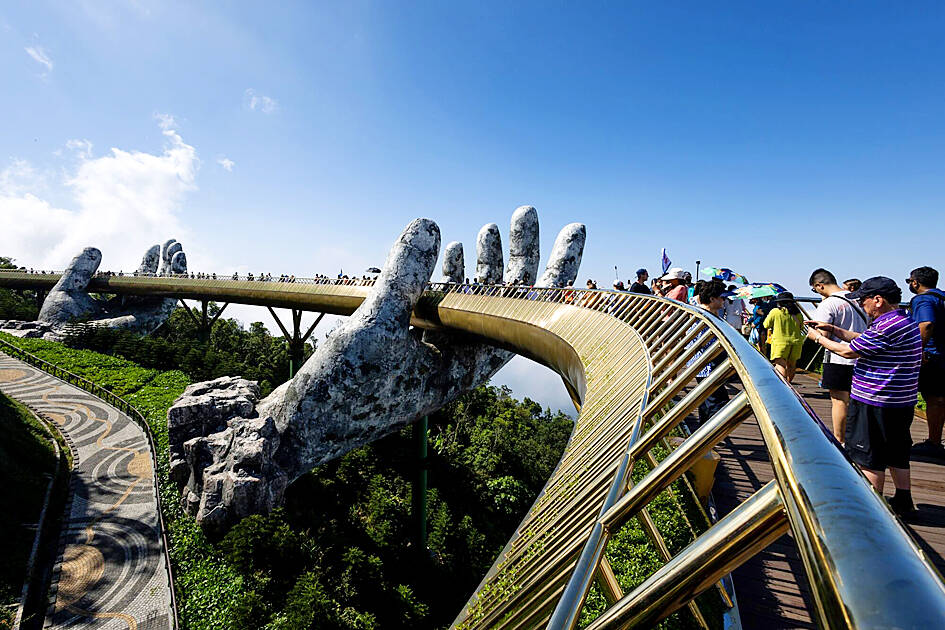Vietnam’s economic growth target of 6.5 percent this year could be at risk amid a global slowdown weighing on exports, lingering crisis in the local property sector and higher interest rates hampering businesses, lawmakers said.
This year’s forecast expansion is proving to be “challenging,” after weak GDP growth in the first quarter and as the construction sector and capital markets face financial difficulties, Vietnamese Economic Committee of the National Assembly head Vu Hong Thanh said at the opening session of the parliament yesterday in Hanoi.
Lawmakers reiterated calls for the central bank to consider more policy rate cuts, and for banks to lower lending rates to aid businesses.

Photo: Bloomberg
There is 104 trillion dong (US$4.4 billion) worth of bonds due in the third quarter, which could present “hidden risk to the markets,” Thanh said.
The State Bank of Vietnam has reduced its key rates twice this year, after GDP slowed to 3.32 percent last quarter while exports shrank in three of the past four months, reflecting the risks that global and domestic challenges pose to one of the region’s fastest-growing economies.
“The world economic situation continued to decline, consumer demand in our main markets dropped sharply due to inflation, geopolitical tensions and countries’ tightening monetary policies,” Vietnamese National Assembly Chairman Vuong Dinh Hue said.
Vietnam, which rarely posted lower than 5 percent GDP growth before the COVID-19 pandemic, is taking a hit from slowing global demand exacerbated by funding woes amid the government’s anti-graft campaign that has deterred investors.
Vietnam’s exports make up more than 100 percent of the economy, making it one of the most trade-dependent nations in the world.
The “property market and its businesses continue facing so many difficulties in liquidity, cash flows with many late in paying bond principals and interests,” Thanh said.
Business activity in manufacturing, especially among small and medium-sized enterprises are impaired by declining global orders, Vietnamese Deputy Prime Minister Le Minh Khai said in a speech.
Fitch Ratings last week said that while property sector risks have made operating conditions more difficult for banks in Vietnam, the “liquidity crunch is easing, and the banking system is likely to avert a sharp slowdown,” thanks to the response of policymakers and lenders.

STILL HOPEFUL: Delayed payment of NT$5.35 billion from an Indian server client sent its earnings plunging last year, but the firm expects a gradual pickup ahead Asustek Computer Inc (華碩), the world’s No. 5 PC vendor, yesterday reported an 87 percent slump in net profit for last year, dragged by a massive overdue payment from an Indian cloud service provider. The Indian customer has delayed payment totaling NT$5.35 billion (US$162.7 million), Asustek chief financial officer Nick Wu (吳長榮) told an online earnings conference. Asustek shipped servers to India between April and June last year. The customer told Asustek that it is launching multiple fundraising projects and expected to repay the debt in the short term, Wu said. The Indian customer accounted for less than 10 percent to Asustek’s

‘DECENT RESULTS’: The company said it is confident thanks to an improving world economy and uptakes in new wireless and AI technologies, despite US uncertainty Pegatron Corp (和碩) yesterday said it plans to build a new server manufacturing factory in the US this year to address US President Donald Trump’s new tariff policy. That would be the second server production base for Pegatron in addition to the existing facilities in Taoyuan, the iPhone assembler said. Servers are one of the new businesses Pegatron has explored in recent years to develop a more balanced product lineup. “We aim to provide our services from a location in the vicinity of our customers,” Pegatron president and chief executive officer Gary Cheng (鄭光治) told an online earnings conference yesterday. “We

LEAK SOURCE? There would be concern over the possibility of tech leaks if TSMC were to form a joint venture to operate Intel’s factories, an analyst said Taiwan Semiconductor Manufacturing Co (TSMC, 台積電) yesterday stayed mum after a report said that the chipmaker has pitched chip designers Nvidia Corp, Advanced Micro Devices Inc and Broadcom Inc about taking a stake in a joint venture to operate Intel Corp’s factories. Industry sources told the Central News Agency (CNA) that the possibility of TSMC proposing to operate Intel’s wafer fabs is low, as the Taiwanese chipmaker has always focused on its core business. There is also concern over possible technology leaks if TSMC were to form a joint venture to operate Intel’s factories, Concord Securities Co (康和證券) analyst Kerry Huang (黃志祺)

It was late morning and steam was rising from water tanks atop the colorful, but opaque-windowed, “soapland” sex parlors in a historic Tokyo red-light district. Walking through the narrow streets, camera in hand, was Beniko — a former sex worker who is trying to capture the spirit of the area once known as Yoshiwara through photography. “People often talk about this neighborhood having a ‘bad history,’” said Beniko, who goes by her nickname. “But the truth is that through the years people have lived here, made a life here, sometimes struggled to survive. I want to share that reality.” In its mid-17th to